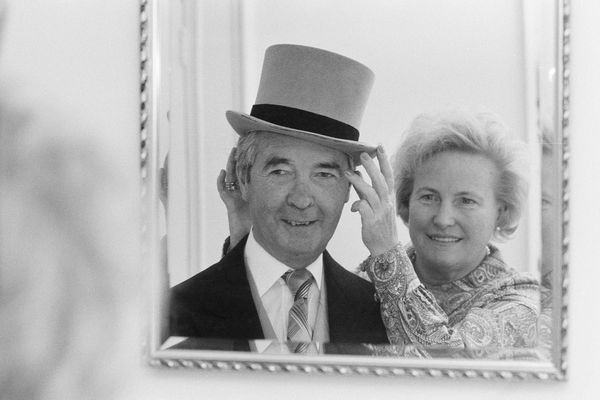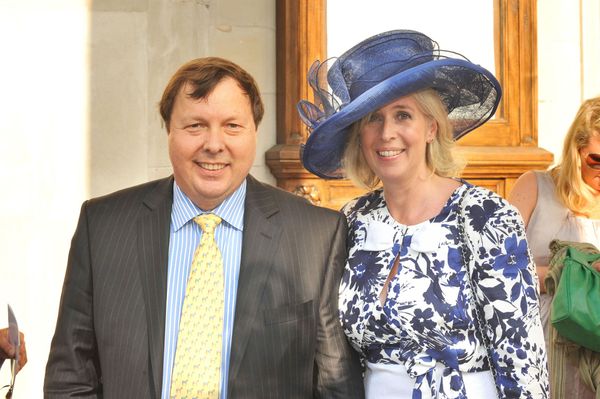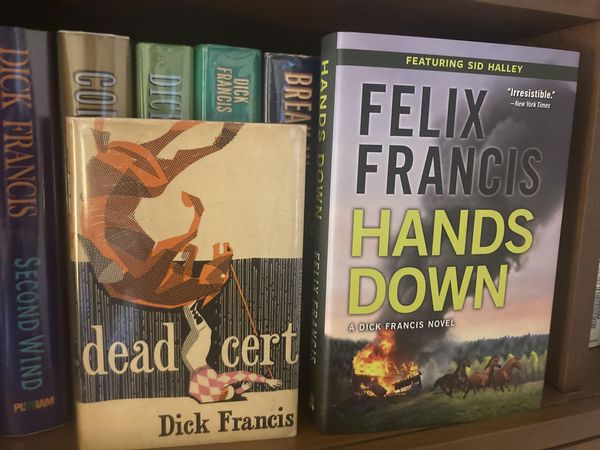
Felix Francis was eight years old when his father's first novel "Dead Cert" was published in 1962. Felix is now 69, and his latest novel "Hands Down" is the new book in the canon of "Dick Francis" novels, the 55th book in the family's 60-year history of horse racing-themed thrillers.
"I grew up in the greatest fiction factory of the 20th century," Felix tells me via Zoom from his home in England. "The discussion over the breakfast table wouldn't be about who was doing the school run, but whether Sid Halley [a disabled private detective who appears in several of the novels] could survive the night with a .38 slug in his guts."
The couple decided to try a suspense novel set in the world of horse racing – and every year for the rest of their life together they published one.
His parents required silence to work, so Felix and his brother would play in the yard – mostly riding the family's horses.
"My father used to sit in his office and we knew when things weren't going very well because he'd lean out of the office window and shout at us saying, 'Get your heels down, boys. Sit up straight.'"
It was in some ways a fiction factory in the Andy Warhol sense of the word – an extraordinarily productive, high quality system for producing popular works, with the precise identity of the creator something of its own mystery.
A death out of the gate
Dick Francis' career as a writer had an inauspicious beginning: One of the top jockeys in England during the 1950s, he went from racing superstar to international celebrity when his horse, Devon Loch, owned by Queen Elizabeth the Queen Mother, inexplicably collapsed 40 yards from the winning post, with a huge lead, at the 1956 Grand National. The fame the heartbreaking loss brought Francis led a literary agent to suggest he write a memoir.
There was talk of hiring a ghostwriter, but instead, Francis' wife Mary – who had an extensive education in English, published short stories and worked in the theater – decided to help her jockey husband, whose formal education had ended at the age of 15, with his memoirs.
When that book, 1957's "The Sport of Queens," was a success, the couple decided to try a suspense novel set in the world of horse racing – and every year for the rest of their life together they published one. By all accounts, the books were a true team effort, and even as the books brought them tremendous wealth, their writing and research dominated their lives. To research 1966's "Flying Finish," Mary learned how to fly planes, eventually starting her own air taxi business and writing a guide to flying light aircraft under her own name. Felix remembers his father constantly pumping people he met at the races for details about their lives and careers that could be fodder for the books.

"I remember going to the Cheltenham races, and we were invited into a box and my father was talking to someone and he was a merchant banker," Felix says. "Then we went out to the car to go home and my father said, 'I'm just going back for a minute.' So he got out of the car and he went back, and my mother and I sat in the car for the next hour and a half, waiting for him. But we knew that he had an idea."
"Dad was full of ideas . . . He would write them, and my mother would polish the prose, as it were."
His father's idea was to ask the banker whether he would lend him a million pounds. The banker, not knowing it was research for a book, proceeded to explain how that might work. The result was Francis's 1982 bestseller "Banker."
In an interview for the 2003 book "The Dick Francis Companion" the former jockey explained, "Mary and I worked as a team. We discussed everything and she was a master at research with a terrific memory for detail . . . I would have been happy to have both our names on the cover."
The exact details of their collaboration are hard to pin down. Felix says, "Dad was full of ideas. I mean, ideas used to fall out him like water over a waterfall. He would write them, and my mother would polish the prose, as it were."
A whodunit with a difference
Unraveling who exactly did what is a little like the plots of some of the "Dick Francis" novels – with even people who worked on the books forensically piecing together clues as to how it all happened.
"There's no better model for how to keep the action and the suspense going."
Olivia Kahn, a publisher's reader at Harper & Row and the sister of Francis' longtime editor Joan Kahn once said, "Joan got letters from Dick, and the person who wrote those letters could not in my view have been the person who wrote books."
One reporter described a late night phone call from Mary, begging him not to mention his suspicions about her role in the books. "Yes, Dick would like me to have all the credit for them but, believe me . . . it's much better for everyone, including the readers, to think that he writes them because they're taut, masculine books that might otherwise lose their credibility. Please don't mention me in your article." Felix disputes that this conversation happened. But a male author was a wise marketing choice for another reason – the rampant sexism in mystery publishing at the time. As Sisters in Crime documented in a 1988 study, women wrote 30-40% of crime novels but received only 6-20% of crime novel reviews.

Otto Penzler, a legendary mystery editor and owner of the Mysterious Bookshop in New York City, thinks the claims of shared authorship are wildly exaggerated.
"Dick Francis was so humble, I wanted to smack him," remembers Penzler, who hosted the author at his store every year for decades. "He gave so much credit to Mary that people started to write that she was really writing the books. I knew Dick really well and I knew Mary really well. We spent a lot of time together, and she said it was all nonsense. She did a lot of the research. Dick would write the novel, and she would go over it and she would correct his grammar and punctuation and spelling – all the things a really good editor would do."
If Mary's contributions were larger than was publicly acknowledged at the time, she wouldn't be the only writer to lend her mind to a celebrity's efforts at fiction. Comedian Joan Rivers and tennis great Martina Navratilova both wrote mysteries that cashed in on their celebrity and knowledge of a certain milieu, with a novelist co-author doing most of the heavy lifting. Ivana Trump published a romance novel; Dick Clark did a mystery. The Kardashians had their names stamped on a YA novel based on a short meeting with a creative director.
A studied execution
What immediately separates the "Dick Francis" novels was that, while they started out as a way to capitalize on a jockey's celebrity following a racing fall, they happen to be widely recognized as among the best crime novels of the second half of the 20th century. Then there was the sustained commercial success: Francis was one of the Top 5 best-selling crime writers for decades, won every major award in crime fiction, and has been an influence on generations of mystery novelists.
Dean James, who co-authored "The Dick Francis Companion" in 2003 before finding perennial bestseller status under the pen name Miranda James with his "Cat in the Stacks" mysteries – in the booming world of cat-themed mysteries, a female pseudonym is advantageous – still sees Francis as the king of the thriller writers.
"Anybody who wants to write a thriller, I'd say you first need to read Dick Francis because there's no better model for how to keep the action and the suspense going," he says.
Penzler, the Mysterious Bookshop owner, tells me that, "First of all, Dick Francis was a great storyteller. He knew how to create exciting scenarios and used a lot of background – serious research. It wasn't just horse racing. He did tremendous research in single malt scotch and photography and banking and all those things. He brought that information to the books. People felt they were learning something while having a great time. His characters were very empathetic. These were ordinary people, not millionaires in penthouses. People identified with them."
What exactly was it that makes the "Dick Francis" novels so special – and makes his son's continuations as memorable and perhaps at times better?
To begin with, there are the intriguing opening lines. A few examples:
"I looked at my friend and saw a man who had robbed me." – "High Stakes" (1975)
"I inherited my brother's life. Inherited his desk, his business, his gadgets, his enemies, his horses and his mistress. I inherited my brother's life, and it nearly killed me." – "Straight" (1989)
"Glue sniffing jockeys don't win the Derby." – "10. Lb. Penalty" (1997)
"I was standing right next to Herb Kovak when he was murdered." – "Gamble" (2011)
Then there was Francis' portrayal of women, which was wildly progressive by the standards of the genre in the 1960s and 1970s.
A 2002 essay in the Los Angeles Review of Books marvels at how, in a genre defined by sexism, the "Dick Francis" novels stood out for their fully developed depiction of women: "Straightforwardly intelligent women . . . are both refreshingly abundant and highly valued in Francis's novels."
The author of this piece appears to have been unaware of Mary's role in the books.
When the sire retires
In 2000, Mary Francis died at the age of 76, and her husband, by then 80 years old, announced his retirement, which lent further fuel to long-running rumors about her role in the writing process.

But after a few years' retirement, Dick Francis' agent came to Felix, a former A-level physics teacher who was then managing his parents' business affairs, and arranged a lunch to explain a problem. There hadn't been a new book since 2000's "Shattered" and, with so many new authors each year, there was a risk of Dick and Mary's world being forgotten and the books going out of print.
With Felix writing the books now, could they get in trouble for false advertising if they claimed otherwise?
The agent asked permission to hire a new author to write a new book and give the backlist a jolt. Felix suggested he might give it a try himself – he had read all the books and had grown up watching his parents work. At 17 years old, he'd designed, and built without the explosive device, a bomb used to blow up a plane in the 1970 book, "Rat Race." It might have seemed brash, but he figured he could write a "Dick Francis" novel. He signed a contract agreeing never to take credit for the book that bore his father's name. The result of that effort, 2006's "Under Orders," spent seven weeks on the New York Times bestseller list, peaking at No. 3. It was also a critical hit, with the Los Angeles Times proclaiming that, "The sheer joy of 'Under Orders' comes from the old master's championship storytelling . . . one of this year's most entertaining mysteries."
What was supposed to be a one-off new novel to revive sales of the backlist was such a hit that the publishers ordered up more – but the lawyers were worried. With Felix writing the books now, could they get in trouble for false advertising if they claimed otherwise? Never mind that the books had always been the output of an entire family's efforts; the solution was to describe the next book as written by father and son together.
But it was Felix who did all the writing, a fact he was able to talk about freely when he was released from the confidentiality agreement eight years after the publication of "Under Orders."
"Dad," he says, "God bless him, by this stage, could hardly remember what he had for breakfast."
When his father passed away in 2010, the books continued. Felix received sole credit as the author, with "A Dick Francis Novel" appearing on the cover.
When I ask Felix about all the machinations and intrigue around who got credit for what, he seems uninterested, and mostly just happy to be carrying on the family business.

Felix has been writing a book a year – to nearly universally positive reviews, though they don't sell the way they used to. In the U.K. press, Felix has discussed the falling advances for the novels. Without the film franchises that have kept new works bearing the brands of departed authors like Tom Clancy and Robert Ludlum on the bestseller lists, the "Dick Francis" books haven't been able to maintain their mega-bestseller status – though they're currently in development for television.
Dean James wonders whether the "Dick Francis" books, brilliant as they are, are just a little tame for what so many modern thriller readers look for.
"The heroes aren't tortured by their lost loves or the fact that their whole families were murdered," James says.
If the books are a bit old-fashioned, that's part of the charm. In a genre now dominated by unreliable narrators and implausible plot twists, the "Dick Francis" novels continue to be page-turning, high-stakes adventure stories of heroes and horses. And Felix, like his parents, invests heavily in research. When I spoke with him, he'd just gotten back from a major racehorse auction.
I ask Felix if writing the books gets easier.
Quite the opposite, he says. As endlessly fascinating as the world of horseracing is, coming up with a plot per year since 1962 has stretched even this family's creativity. And Felix, who writes at a desk with photos of his parents in front of him, is struggling. The hero of the new book is a horse auctioneer, but Felix can't quite figure out what the "dastardly deed" will be.
"I can't use the 16 [plots] I've already used, obviously. And I can't use 39 others that Dick Francis used. And it gets very, very much more difficult every year to think of a story."
The latest book, "Hands Down" (Crooked Lane Books, Nov. 9) received a starred review from Publishers Weekly, which called it "excellent" and "a perfect homage to his father Dick's major continuing character, champion jockey-turned-PI Sid Halley."







